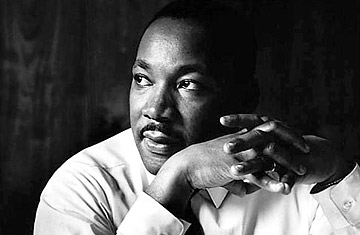
(2 of 11)
King preaches endlessly about nonviolence, but his protest movements often lead to violence. He himself has been stabbed in the chest, and physically attacked three more times; his home has been bombed three times, and he has been pitched into jail 14 times. His mail brings him a daily dosage of opinion in which he is by turn vilified and glorified. One letter says: "This isn't a threat but a promise—your head will be blown off as sure as Christ made green apples." But another ecstatically calls him a "Moses, sent to lead his people to the Promised Land of first-class citizenship."
Cadence. Some cynics call King "De Lawd." He does have an upper-air way about him, and, for a man who has earned fame with speeches, his metaphors can be downright embarrassing. For Negroes, he says, "the word 'wait' has been a tranquilizing Thalidomide," giving "birth to an ill-formed infant of frustration." Only by "following the cause of tenderheartedness" can man "matriculate into the university of eternal life." Segregation is "the adultery of an illicit intercourse between injustice and immorality," and it "cannot be cured by the Vaseline of gradualism."
Yet when he mounts the platform or pulpit, the actual words seem unimportant. And King, by some quality of that limpid voice or by some secret of cadence, exercises control as can few others over his audiences, black or white. He has proved this ability on countless occasions, ranging from the Negroes' huge summer March on Washington to a little meeting one recent Friday night in Gadsden, Ala. There, the exchange went like this:
King: I hear they are beating you!
Response: Yes, yes.
King: I hear they are cursing you!
Response: Yes, yes.
King: I hear they are going into your homes and doing nasty things and beating you!
Response: Yes, yes.
King: Some of you have knives, and I ask you to put them up. Some of you may have arms, and I ask you to put them up. Get the weapon of nonviolence, the breastplate of righteousness, the armor of truth, and just keep marching.
Few can explain the extraordinary King mystique. Yet he has an indescribable capacity for empathy that is the touchstone of leadership. By deed and by preachment, he has stirred in his people a Christian forbearance that nourishes hope and smothers injustice. Says Atlanta's Negro Minister Ralph D. Abernathy, whom King calls "my dearest friend and cellmate": "The people make Dr. King great. He articulates the longings, the hopes, the aspirations of his people in a most earnest and profound manner. He is a humble man, down to earth, honest. He has proved his commitment to Judaeo-Christian ideals. He seeks to save the nation and its soul, not just the Negro."
Angry Memories. Whatever his greatness, it was thrust upon him. He was born on Jan. 15 nearly 35 years ago, at a time when the myth of the subhuman Negro flourished, and when as cultivated an observer as H. L. Mencken could write that "the educated Negro of today is a failure, not because he meets insuperable difficulties in life, but because he is a Negro. His brain is not fitted for the higher forms of mental
